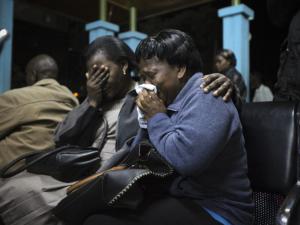By
Joe Khamisi
Once again, Kenyans are asking questions about their safety. And the questions are genuine. Angered by the latest attack in Mandera in which 28 innocent Kenyans were murdered by Al Shabaab, the citizens are, once again, raising pertinent queries about their Government’s ability or inability to deal with terrorism.
How did the terrorists cross the border from Somali without being detected? Did they pass through the common entry point into Mandera? If so, where were the security forces?
If they used panya routes, where was the intelligence service?
The backbone of any country is its security machinery. Without a versatile, effective internal security organ, no country can survive. Did the intelligence have prior information about the planned attack? If so, did it share they with other branches of government?
A senior politician in the affected region says he sent a warning weeks ago that the country was about to be attacked. Did the intelligence people get this information? If so, why didn’t they act on it to stop the terrorists?
The Kenya Defence Forces has been in Somali since October 2011 with the mandate to pursue and destroy Al Shabaab camps and so thwart threats to Kenya’s peace and stability. How come these killers are still able to travel all the way from their camps and enter the country without being detected? Where is our military in Somalia?
Another question. Are the top Government officials in charge of security up to the task? This question has been asked many times since the terror attack at Westgate Mall last September. Both the Cabinet Secretary and the Inspector General love repeating the same song: that the country is safe. But is it really? How can it be safe when people are killed everywhere?
There is a principle that the buck stops with the President. So, what does Uhuru Kenyatta plan to do now?
We find Ole Lenku and Kimaiyo easy targets for bashing, but the man most responsible for our security is none other than the President himself. All the cries of “Lenku must go” are misplaced. His removal or resignation and that of the Inspector General of Police will result in nothing if the Commander-in-Chief is not willing to change tact and act tougher in the war against terrorism.
We cannot wait for outsiders to fight terrorism for us. The regional body IGAD is impotent and the African Union is uninterested.
It is up to Kenya to devise measures – which should not exclude the invasion of Somali – to get to the nerve centre of the Al Qaeda-affiliated Al Shabaab.
In the case of Mandera, the Deputy President Wiliam Ruto has confirmed that Kenyan troops pursued the killers into Somali and killed hundreds. An Al Shabaab spokesman has denied such reprisal took place. Who is wananchi to believe?
The weak and wobbling Mogadishu Government has neither the resources nor the political will to deal with the brigands within its borders. In effect, Somali cannot claim to be our ally in this war against terror.
While this is going on, the Kenya Government must also deal more ruthlessly with those in the country, who aid and abet recruitment of youths into terror groups.
Recent security operations in Mombasa – the hub of terrorist cells – including the closure of radical mosques and arrest of suspected killers, are commendable moves, but not quite enough.
If they are really committed to helping the Government, Muslim political and religious leaders must stop giving excuses and hiding behind religion. They must give the Government unconditional support in flashing out those in their midst who are tarnishing the name of Islam and destroying our country.
They cannot be bystanders or uninterested parties.



No Comments Yet!
You can be first to comment this post!